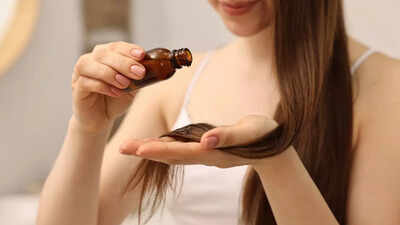ARTICLE AD BOX

When it comes to maintaining healthy, shiny hair, natural oils like coconut, argan, and almond are often key components of hair care routines. These oils provide nourishment, moisture, and a protective barrier against environmental stressors, keeping hair soft, manageable, and vibrant.
However, applying too much oil can do more harm than good. Over-oiling can lead to greasy, weighed-down hair, clogged follicles, and scalp issues such as dandruff or irritation. Many people mistakenly assume hair problems are solely genetic, overlooking the impact of excessive oil use. Understanding how to apply oils correctly and balance their use with proper cleansing is essential. By managing oil application wisely, you can maintain strong, healthy, and beautifully nourished hair without compromising scalp or strand health.
How hair oils nourish and protect your scalp
Our hair and scalp produce natural oils, also known as sebum, which act as a protective barrier for hair strands. These oils keep the hair hydrated, soft, and naturally shiny. They also shield hair from environmental damage, such as sun exposure, dust, and pollution. While our scalp naturally produces enough oil to protect and nourish hair, external oils are often applied to supplement this natural layer. Using oils in moderation can improve hair texture, reduce frizz, and strengthen the hair shaft, but too much can have the opposite effect.
A study published in the National Institutes of Health's PubMed Central discusses the use of hair oils as emollients believed to prevent hair loss, bring shine, volume, and prevent greying. However, it also highlights the importance of understanding the potential risks associated with excessive use of hair oils.Over-oiling occurs when the scalp and hair strands accumulate more oil than needed. This can happen if you apply too much oil, use heavy or greasy oils, or wash your hair infrequently.
While applying oil once or twice a week can benefit hair, daily heavy oiling or leaving oil in for extended periods can cause build-up. Over-oiling doesn’t just affect hair appearance; it can also interfere with the natural hair growth cycle and create scalp issues.
Why too much hair oil can harm your scalp and strands
Clogged hair follicles
When the scalp produces or accumulates too much oil, it can mix with dead skin cells and environmental debris, forming a layer that blocks hair follicles.
Hair follicles are tiny openings in the scalp through which new hair grows. If these follicles are clogged, it becomes harder for fresh hair to emerge properly. Over time, this blockage can slow down hair growth, cause hair thinning, and increase hair fall. In some cases, the follicles may become inflamed, leading to weak, brittle hair that breaks easily.
Many people wrongly assume that thinning hair is purely genetic, but over-oiling or not cleansing the scalp properly can be a hidden cause of hair loss.
Weighed down and greasy hair
One of the most visible signs of over-oiling is hair that looks limp, heavy, and greasy. When hair absorbs too much oil, it loses its natural bounce and volume, making it appear flat and lifeless. Styling becomes difficult because oily strands stick together, and even freshly washed hair can quickly regain a greasy appearance. Using heavy oils, like castor or coconut, excessively can add weight to hair strands, pulling them down and making them harder to manage.
This can affect self-esteem, as many people feel embarrassed about greasy hair and may try to wash it more frequently. Ironically, washing too often can disrupt the scalp’s natural oil balance, causing it to produce even more oil and worsening the problem.
Increased risk of scalp conditions
A scalp that is coated with excess oil provides an ideal environment for bacteria, fungi, and yeast to thrive. This can trigger common scalp issues such as dandruff, scalp acne, and seborrheic dermatitis.
Symptoms often include itching, redness, irritation, and flaky skin, which can be uncomfortable and persistent if left untreated. Over-oiling can disrupt the delicate balance of microbes naturally present on the scalp, reducing its ability to fight off infections.
If ignored, these conditions may become chronic and require medical attention, highlighting the importance of regulating oil levels and maintaining proper scalp hygiene.
Prevention and management of over-oiling
Balanced hair care routine
The key to avoiding over-oiling is maintaining a balanced hair care routine. Use lightweight oils or leave-in treatments that nourish without leaving excessive residue. Always go for products specifically formulated for your hair type, whether it’s fine, thick, curly, or straight. Regularly adjusting your hair care routine according to seasonal changes can also help maintain the right moisture level.
Scalp exfoliation
Gently exfoliating the scalp can remove excess oil and product build-up.
Clarifying shampoos, scalp scrubs, or natural treatments like oatmeal or clay masks can help cleanse the scalp and restore balance. Exfoliation also stimulates blood circulation, which promotes healthier hair growth.
Regular washing
Washing hair with a mild, clarifying shampoo helps remove trapped oil without stripping the hair completely of its natural protection. Follow with a conditioner or hair mask to restore hydration and softness.
Washing frequency should be balanced according to hair type, lifestyle, and scalp needs to prevent excessive oiliness or dryness.Natural oils are essential for healthy hair, but moderation is crucial. Over-oiling can cause clogged follicles, greasy hair, and scalp conditions. By using hair oils appropriately, incorporating a gentle cleansing routine, and listening to your scalp’s needs, you can enjoy the benefits of hair oils without the risks. Striking the perfect balance allows you to maintain shiny, strong, and healthy hair all year round.
In conclusion, achieving healthy hair is not about using more oil, but about using the right amount. Moderation, care, and understanding your hair type are the secrets to maintaining vibrant, nourished hair. Also Read: Natural skincare with anjeer (fig): 6 DIY remedies for glowing and healthy skin

 8 hours ago
2
8 hours ago
2









 English (US) ·
English (US) ·